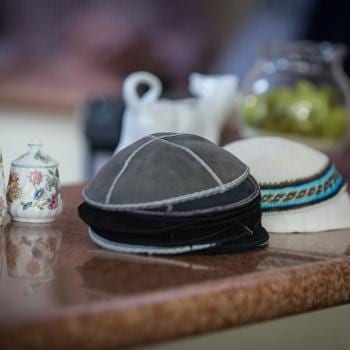The Vision, by Debi Pearl, pp. 1-10
I wasn’t going to do this. I really really wasn’t. I got my hands on Debi Pearl’s novel, The Vision, ages ago, but it seemed too, well, too Debi. Too much, maybe. But I picked it up this week and, in an odd way, I think it helps explain what happened in 2016. The book was published in 2009, and it’s a wrapped up amalgam of white working class Christian fears. To a ridiculous extreme—an instructive extreme. And it’s also, frankly, bad fiction, which is what many of you enjoy so much about my review series.
So, let’s give this a shot, shall we?
6 A.M., Seattle, February 11
Asher Joel felt strangely detached, staring at the thick, gray morning fog cloaking the world beyond the diner’s window. A single droplet of water, released from the window’s condensation, captured his attention as it zigzagged down the inside of the plate glass, finally dropping onto the window sill. He glanced down to the lightly rolled newspaper lying by his left hand. Last night’s bombing in Atlanta dominated the headlines, but Yellowstone’s latest series of earthquakes competed for the public’s attention. Funny—they were getting used to the bombings.
This really isn’t bad, as writing goes. Description of the setting, and enough mentions of strange happenings in the story’s universe to pique our interest and leave us with questions.
He unconsciously murmured as he thought of the irony of the big deal the news was making of a few small earthquakes while keeping the big news of Yellowstone quiet. He understood why his brother, a government volcanologist, and told him eh whole truth would not be released to the public. What use would it be to awaken the public to the knowledge that deep in the recesses of Yellowstone Park lay a waking monster? What could anyone do?
What could anyone do??
Well, let’s see. When Mt. St. Helens threatened to erupt, they evacuated the area. That’s a thing people can do! And yes, I get that if Yellowstone blows, it’ll be very very much bigger and much much worse, but if—in this universe—such an eruption appears to be nigh, the government damn well better do something!
Oh by the way, this book has footnotes. Debi includes the url to this article, and quotes from it liberally, in the footnotes at the bottom of several pages in this section. The upshot is that there is movement in the magma under Yellowstone, but that—absent changes like earthquakes—that is not a sign that it’s going to erupt. The article quotes a scientist at the U.S. Geological Survey, which Debi includes:
“Eruptions are far enough apart that there is a very low probability of the next eruption happening in our lifetimes or anytime soon. The flipside is: the system has been active for millions of years and it’s going to erupt again sometime.”
So I did a little bit of digging. I know Yellowstone could in theory erupt again in our lifetimes—I’ve been there and they do quite a bit of talking about that. So I wondered: would we all die? The answer appears to be no. If Yellowstone were active and in imminent danger of erupting, it looks like some serious evacuations would be in order—similar to evacuations for hurricanes, but almost certainly lasting much longer. The idea that nothing could be done, and that the government should just hide the risk in this case, is astounding and false.
But this is an apocalyptic novel, so.
A small burst of laughter from two tables down caused him to shift his glance toward two old fishermen that had often come in to eat while he and Dan dined. Now, even in the diner people were subdued and withdrawn. Laughter had become a strange sound that caught your attention. Again a mumbling groan escaped from Asher’s clenched lips as he mulled over a more local threat. The locals called it The Muslim Invasion. This threat tempered locals’ ready laughter, their interest in politics, even their fishing.
It muffled every aspect of their lives.
So. Yeah.
Trump has become so very very focused on the “threat” caused by immigrants from Central America, it’s easy to forget for a moment that one of his first actions in office was an attempt to ban Muslim immigrants from coming to the U.S. In Trump’s 2016 campaign, harsh language about the threat Muslim immigrants pose to America was nestled in there with claims that Central American immigrants were murderers and rapists.
You remember all the fear mongering about Sharia Law, right? This has been a central part of the Right’s narrative for many years—at least since the 9/11 terrorist attacks. This idea that Muslim immigrants are a third column and that our communities are going to be taken over by them and dominated by Sharia Law. This narrative is built on a series of false claims and manipulated (or outright false) stories.
Debi offers us an easy demonstration of this sort of rhetoric and misinformation. In her footnotes, she links to an article titled “Sharia finance helping Muslim immigrants in Minnesota buy up foreclosed homes.” She also links to an awful article by anti-Islamic bigot Pamela Geller (link to wayback machine listing).
In the footnote, Debi describes a new mortgage program developed by Minnesota Housing as Sharia law “creeping into the US through none other than a state government program,” when in fact all that happened was that the state housing authority began offering a loan program that lumped the interest together into a higher upfront buying cost, to accommodate Muslims who feel that conventional mortgages are not in line with Islamic strictures against taking out loans with interest payments. Muslim buyers still pay the same amount as other buyers; the payments are just structured in a slightly different way.
Now sure, one could argue that state housing authorities shouldn’t create programs that cater to one group’s religious strictures. But from the state housing authority’s perspective, it is a good thing to get people into housing, and getting people into foreclosed houses is better than letting those houses sit on the market (remember, these news articles were from 2009, in the middle of the housing crisis). Again, these programs did not ask Muslims to pay any less than anyone else—the loans were merely structured differently.
So there’s your “scary” Sharia law.
But anyway, enough talk about Shariah law—back to the book, and back to our protagonist, Asher Joel, sitting alone and sad in a diner on a dreary February morning in Seattle:
It happened gradually, the influx of Arabic speaking Muslims into their small coastal area of Washington State … but now the fear subdued all of life’s joys and trials.
Even grief.
I swear, the Right would not exist without fear mongering.
Quickly Asher turned again to face the window. A solitary tear slid down his face, a manifestation of his lost. Old Dan had been a good friend—more than a friend. Dan had been almost like a father.
Quick note—the backdrop to the beginning of the book is that Asher’s friend and mentor, Dan, has died. We haven’t been told how yet, but we’re very quickly given to believe it has something to do with the Muslims—and with Dan’s steadfast Christian faith. Asher has come back to this diner because it is a place he associates with Dan, who was a constant present here.
A rush of cold morning dampness accompanied the sound of the door opening. Another pair of old fishermen pushed through and took their customary seats, each turning stiffly to Asher, offering silent condolences with the meeting of eyes and the slightest of nods. It was a gesture that expressed their shared sorrow, only understood and appreciated by proud alpha males. Asher’s cold blue eyes acknowledged tier tribute before turning back to look at the gray swirl.
Proud. Alpha. Males.
He stared at the reflection of the hardy fishermen seated around him. What will become of this world of simple fishermen and small diners? Men like Dan, who worked hard all their lives, had old time values and were American to the core. Men like Dan died when they stood up for what they believed. The young man clenched this jaw as his ears seemed to fill with a roar.
Okay, there it is—fear of the other, a belief that “America” at its core means old diners and simple (white) fishermen, people with “old time values” who “worked hard all their lives.” This is real America. The “other”—whether it be Muslims or, for Donald Trump, Central American immigrants—threatens this America.
Too much knowledge is deafening. It screams at your soul, not allowing you to enjoy music, laughter, dreams, or even the thought of a good woman. With trembling hands he carefully laid aside the salt shaker he had been casually pushing back and forth.
… the thought of a good woman?
Almost as if it were an open, he caught a fleeting glance of scurrying Muslim men rushing off to where they would need together toward Mecca. A deep furl appeared between his eyes. His hands doubled up into hard fists.
Note the use of the term “scurrying.”
So far, I have quoted the book’s first two pages directly. Going forward, I am going to be far more selective—and descriptive. And it won’t all be this heavy. Trust me. There are some absolutely bizarre bits that have nothing to do with racism and everything to do with very strange writing choices.
For example! As Asher is sitting at the diner, he’s approached by Louise, an older waitress who “looked as if she were born to be a waitress in a low-class diner,” with colored hair and penciled on eyebrows. Louise wants to talk to Asher about Dan, Asher’s deceased mentor. She tells Asher that Dan found her strung out on drugs—she apparently offered Dan some “comfort,” and he turned her down and sent her to Christian rehab, helped her get cleaned up, helped her get a job, and ultimately helped her buy this place.
But here’s the thing about Louise. She talks like this:
“Sho-wah, Honey; it’s goo-ahd fooahd.”
Oh yes.
Her voice always surprised newcomers with its distinctive New England ‘Kennedy’ clip and its touch of Old World class, in odd contrast to her appearance.
I mean … maybe? But I’m familiar with a Boston accent and it, at least, doesn’t sound … like this. And also, it’s generally bad form to write heavy dialect into your dialogue like this. It’s frankly hard to read.
“We knew you’uhd be bahck at least one more time. Like a memorial ta Dan. We needed you ta come jus once more so’s we could say goodbye to ‘im too.”
Make it stop.
“Do you mind if I join you foh-wah a minute? I know it’s not good waitress manners, but yo’wah truck looks loaded, so I guess yo-wah leaving this area, and I wanted to tell you something befo-wah you go.”
I’m telling you, it’s all like that, and worse.
“Gosh, Honey, mah favorite thing in life is watchin’ a man eat. So eat up! It will make it easier fo-wah me ta tell you about me’n Dan.”
I just, I can’t. I can’t with this.
Okay, so anyway, Louise tells Asher what an amazing man of faith Dan was, how he prayed out loud every morning before eating, in the diner, even if there were Muslims there, and how he rescued her and most all the other waitresses too, and how he taught them all about God.
“He wasn’t much of a talkah, but he sho-wah introduced us ta God.”
So then she starts talking about how Dan got killed.
The old man had proven he cared deeply for the Muslim youth by cashing in all his stocks and using the money to finance the translation of the God’s Story book into the Arabic tongue.
He did know the Bible has already been translated into Arabic, yes?
Then he had hired a webmaster to create a site with God’s Story in all five dialects of Arabic. Unhesitantly, old Dan passed out thousands of business cards in the local school containing the web address where Muslim youth could read the truth.
Wait, he was passing this out in school?
I firmly believe that children and teens should have access to information, including information about both their beliefs and the beliefs of others, about science, about history, and about religious studies and comparative religions. But I am also firmly against adults proselytizing children and teens. And I am especially against adults proselytizing other people’s children. Public schools should be places that encourage children to think critically and seek out information; not places where people try to convert children.
Asher dropped his head as he thought of the many hours the old man had prayed for the Muslim teens that now constituted a substantial minority in the local schools.
Now Dan was dead.
They said it was a gas leak in the kitchen that caused the explosion. The investigators said there was no evidence left to say otherwise.
Yet…
Lovely.
The old woman’s voice broke into his reverie. “I still can’t understand why he went into the mosque to preach the gospel. He knew theys was after him, but you know Dan … he wouldn’t stop until evar one of them had heard of the one God and his only Son Jesus.”
It sounds like a restraining order may have been in order.
To be completely clear, I am 100% against killing someone for preaching their religious beliefs, no matter how annoying or inappropriate they are being—and we are very clearly meant to believe that foul play was involved in Dan’s death. Dan’s actions did not at all merit his death, and there absolutely are places in the world where Muslims kill Christians for proselytizing—as well as places where Muslims kill atheists, especially if they blog or talk about their atheism. This is absolutely and completely wrong.
But I also want to be clear that in the United States, it is far more common for Muslims to be killed in hate crimes against Muslims than it is for Muslim immigrants to kill Christians like Dan (and there are many Christians like Dan). Far more Muslims in the U.S. live in fear of hate crimes than the other way around.
This is why I called this fear mongering.
But anyway! Why is Dan’s truck packed? I’ll let Louise tell it:
“I know Dan was intrahsted in the Hmong people over in Thailand gettin’ that God’s Story book. With Dan gone, we figyahd you’d head to the hills of East Tennessee ta be a paht of the The Last Publishahs ministry.”
Asher raised his eyebrows.
“Oh, we know ahll about The Last Publishahs. He signed us up ta receive TLP magazines yeahs ago, so we have been readin’ all about the diffrahnt translations of that Bible story book he’s been givin’ out to the Muslim kids. Hey we, ahll figured you would court that gal in the magazine … now, she is cute!”
So there’s a ministry in Tennessee—just where Debi Pearl’s own ministry, No Greater Joy, is—and its main gig is translating a special animated version of the Bible into all sorts of different languages—just like No Greater Joy’s Good and Evil Story Book, a graphic novel version of the Bible that they’ve now translated into more than thirty languages. This “The Last Publishers” ministry in Tennessee, which Asher is setting off to join, is Debi’s stand-in for No Greater Joy ministries. That’s some author surrogate.

Do you know what gets my goat about all of this? The Bible already exists. And it has already been translated into all of these languages. Why do they need a specially-curated graphic novel version in all the languages? I think I know why: because the Bible isn’t anywhere near as clear as fundamentalist evangelicals like Mike and Debi Pearl claim it is. In order to share their version of the Bible, they have to literally rewrite it themselves.
Which is exactly what they’ve done.
The Pearls claim they created their comic book Bible because, when their daughter was a missionary in Papua New Guinea, the language barrier proved to be a problem, and she found she wanted pictures she could show, to help her tell the story. This book is meant to serve that purpose. This seems off to me, because it seems like the solution would be to learn the language—and because many groups in places like Papua New Guinea have vibrant storytelling cultures. Acting like they can only understand pictures sounds racist to me.
But also, look how the Pearls describe the book’s contents:
Good and Evil contains 312 full-color pages broken down into 13 chapters that tell the complete story of the Bible. It starts at the very beginning, detailing how the world was created as well as the fall of Adam and Eve. It then describes in detail Christ’s birth, life, suffering, death, and resurrection. Finally, it concludes by relaying some of the information found in the last book of the Bible: Revelation. This includes a modern story of judgment in which John Doe receives justice based on the deeds of his life which serves as a lesson and warning to all who read it. God is just, yet people need to make sure they live holy lives so that they will ultimately be saved during the final judgment.
Their graphic novel basically a glorified Chick tract. It’s not the Bible; it’s something different from the Bible. It’s the story Michael Pearl wants to tell. It’s quite literally the fundamentalist’s Bible.
So! Our brave hero Asher is off to join The Last Publishers and to continue his mentor Dan’s work using glorified Chick tracts to spread fundamentalist Christianity to the dangerous, violent Muslims who are flooding America and taking it over one community at a time. And Yellowstone is threatening to erupt. And there’s a girl at The Last Publishers waiting with bated breath to be Asher’s love interest.
What could go wrong?
I have a Patreon! Please support my writing!















